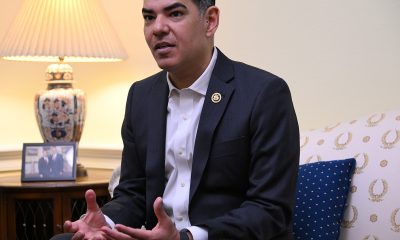Opinions
The case for moderate LGBTQ 2020 Democrats
Pragmatism is something independent voters want from candidates


The 2020 Democratic primary election is heating up, which is causing thousands of other important elections that are coming up next year, and in some cases this November ― congressional, gubernatorial, state house, town council, and even school board―to be criminally overlooked.
It’s safe to assume that many of the candidates who will toss their hats into the ring in an attempt to help the Democratic Party continue the momentum of last November will be candidates who identify as LGBTQ. Although Mayor Pete Buttigieg has been holding his own in the crowded presidential primary field, LGBTQ candidates should expect uphill battles.
The key seats that the Democratic Party will need to win in order to inch closer toward either establishing or solidifying majorities are mostly in moderate and conservative districts. Because of that, if LGBTQ candidates want to be part of the solution, they’re going to have to downplay identity issues and instead campaign hard on the universal policies that affect voters no matter their sexual or gender identities. Also, as voters we’re going to have to accept the fact that not all of the LGBTQ 2020 candidates will be “queer enough” for us.
Examples of LGBTQ candidates who have run in, and won, historically moderate and conservative districts are limited; however, the way in which those who have done so should be studied by the current crop of potential LGBTQ 2020 candidates.
Despite not receiving the coveted endorsements of Sen. Bernie Sanders and Rep. Alexandria Ocasio-Cortez, like her most formidable primary challenger Brent Welder, lesbian Rep. Sharice Davids managed to turn Kansas’ 3rd congressional district blue for the first time since former Rep. Kevin Yoder claimed the seat for Republicans during the 2010 midterm election. Davids certainly can’t be mistaken for a conservative, but she has successfully managed to eke out a comfortable perch for herself as a pragmatist. Pragmatism above all else is something that the vast majority of independent voters—the voters who largely decide elections in moderate districts—want from candidates because it shows that they value compromise over partisanship.
Gay Rep. Sean Patrick Maloney’s defeat of former Rep. Nan Hayworth in 2012 for New York’s 18th congressional district was undoubtably aided by his decision to position himself as a moderate. By focusing on helping the middle class instead of championing corporate tax cuts, he was able to more broadly appeal to the district’s constituents than Hayworth, who seemed to get swallowed up in the Tea Party’s unabashed love of stoking cultural resentment despite the fact that she largely avoided taking forceful stances on polarizing issues.
Bisexual Rep. Katie Hill contributed to the Democratic Party’s success in winning back the House of Representatives last November by flipping California’s 25th congressional district by making healthcare, getting big money out of politics, and rebuilding the middle class her major campaign issues ― issues that unquestionably touch the lives of all Americans no matter their race, gender, nationality or sexual orientation.
Del. Danica Roem, the first openly transgender individual to be seated in a state legislature, won her seat in the Virginia House of Delegates in 2017 by running on a platform that centered around the universal issue of fixing problematic roads. Unlike former Del. Bob Marshall, who campaigned on divisive rhetoric by referring to Roem with male pronouns and touting his record of authoring homophobic and transphobic bills, Roem put her nose to the grindstone and showed a dedication to being a problem solver.
Although it’s unpopular to call for moderation in a climate that seems to feed off of the leftist policies that are being forwarded by Sens. Elizabeth Warren and Sanders, we need to be realistic and keep our eyes on the races and candidates that aren’t flashy because they will end up mattering more in the long run. House Speaker Nancy Pelosi had it right back in April when she said that a glass of water could win in districts like her own and the one represented by Ocasio-Cortez as long as it had a “D” next to it on the ballot. Districts like Davids,’ Maloney’s, Hill’s, and Roem’s should be the focus because our futures are dependent upon Democratic majorities.
Aila Alvina Boyd is a writer based in Ararat, Va.
Opinions
Keir Starmer has blood on his hands
British prime minister’s foreign assistance cuts will kill people with HIV

My name is Mijan. I’m a born and bred East Londoner, a child of immigrants, an ACT UP London/UK activist, and I live with HIV. ACT UP UK and our kin across the pond, ACT UP US, was founded to fight and champion rights of people living with and affected by HIV/AIDS. We are a global coalition that believes in Fund Healthcare Not Warfare, a transatlantic movement that demands global health justice and an end to military prioritisation over the health and wellbeing of human life. The threats we face are the same from funding cuts, state suppression, and queer erasure. U.S. or the U.K. we sing from the same hymn sheet: We will not stand by while our lives are at risk.
On April 8, eight of us ACT UP Activists disrupted Prime Minister Keir Starmer’s Liaison Committee. We were peaceful and determined to execute our die-in. Security was almost as determined to make sure we didn’t. They strong-armed us out of parliament like we were a threat. We tried to begin our die-in, to make a statement for the lives at stake, but instead we were rammed out the revolving doors as we were leaving, which they ended up jamming and dumped on the stairs of Portcullis House. We made the best of a bad situation and laid on the dirty grounds — because this is what democracy looks like in the U.K. when it’s under attack.
Why were we there? Because we are scared and angry. Because we are regressing. Because AIDS cuts means death.
Keir Starmer’s Labour government is enacting the most drastic reduction in U.K. AID cuts we have seen in many years, slashing it from 0.5 percent of gross national income to 0.3 percent by 2027. This is the lowest level of Official Development Assistance spending in years — and it’s being justified to increase defense spending. More missiles, fewer medicines. More tanks, fewer treatments.
Starmer, you justify this under the guise of “security” — but whose security are you protecting? It’s not mine. I live with HIV, and I’m only alive today because of global health funding, funding that made treatment, programs, and vital research possible. Thanks to that support, HIV is no longer a death sentence for many of us. But that’s not the case for everyone.
Not everyone has the privilege of being born in countries like the U.K., where treatment is accessible and free. Many will die because of funding cuts. Many will lose loved ones. We will see HIV contraction rates rise. We will see preventable deaths increase.
Kier, what you are doing is wrong! What you are doing is horrible! What you are doing is deadly!
Don’t take my word for it. Listen to our world health experts. The World Health Organization’s Director-General, Tedros Adhanom Ghebreyesus, has warned that these cuts could cause over 10 million additional HIV infections and three million HIV-related deaths. A new modeling study published in the Lancet HIV by the Burnet Institute backs this up — projecting a 24 percent reduction in international HIV funding by 2026 if current trends continue. Twenty years of progress in HIV treatment and prevention could be wiped out by a single budget.
Deplorable.
Is this what Labour stands for? I thought this party would fight for us.
HIV/AIDS disproportionately affects queer people and people of color — already marginalized communities who are now being discarded. Labour was created by and for people who lived on the fringe of society, the little guy. Labour is meant to empower, support and protect the vulnerable, not sacrifice them. Labour is meant to listen to the people, not silence them and ram them out like cattle to slaughter. Labour should be ashamed. You are not for the people.
We were there for a reason. We were there because lives depend on it. We showed up because diplomacy failed. When we chose peaceful protest, we were met with aggression and suppression. That’s what we need to talk about too. Because this isn’t just about foreign aid anymore — this is also about our right to protest being attacked.
When activists are forced out of parliament for daring to peacefully protest against inhumane policies, it truly puts into perspective a dying democracy.
Democracy is no longer open to the people. Our ability to protest is now treated as a threat to power. Our democracy is under threat. And it’s not just from Tory strongmen. It’s from the very party that’s supposed to be on our side.
This Labour government has abandoned its principles and has abused people’s trust. That it will turn its back on migrants, on the poor, on queer people, on disabled people, and now — on people living with and at risk of HIV/AIDS. It is morally bankrupt.
Bombing your way to justice will not achieve equality. Ignoring a global health crisis and is not progressive. Get your priorities straight: Fund health care, not warfare. Invest in life, not death. Restore the 0.5 percent foreign aid commitment, and stop treating the most vulnerable lives on the planet as expendable.
Keir Starmer, you have blood on your hands.
You may have pushed us out of parliament, but we will not be silenced. We will be louder. We will be bolder. We will not let this die. ACT UP has always believed in one simple truth: SILENCE = DEATH.
Mijan is a pseudonym for an HIV-positive activist who believes that SILENCE = DEATH.
Opinions
Science must not be a weapon against trans people
HHS directive would fund studies on ‘detransition’ among children

A concerning research directive is quietly circulating through the U.S. Department of Health and Human Services. The directive, issued in response to presidential Executive Order 14187, calls for the National Institutes of Health to fund studies focused on “regret” and “detransition” among children who have accessed gender-affirming care. It explicitly demands that researchers avoid “subsidizing or incentivizing” such care – language that is both vague and deeply ideological.
President Trump’s executive order, titled “Protecting Children from Chemical and Surgical Mutilation,” was signed in January 2025 and frames all gender-affirming care for minors as inherently dangerous. It calls for an investigation into the “long-term side effects” of such care and restricts federal funding to any institution providing it. In effect, it lays the groundwork for a federally sanctioned research agenda that aims not to understand transgender health but to discredit it.
Behind the recent HHS memo lies a dangerous truth: The federal government is attempting to repurpose science as a tool for political ideology. If this directive proceeds, it will not only erode the credibility of public health research, but it will also put transgender lives at risk.
This warning is not hyperbole. The memo uses inflammatory language like “chemical and surgical mutilation” to describe standard gender-affirming treatments such as hormone therapy and surgery. These terms are not neutral. They are the rhetorical weapons of anti-trans movements, now embedded in federal policy language. Their use signals a chilling shift: science is no longer being asked to explore, understand, or improve lives. It is being asked to justify harm.
Let’s be clear: Regret following gender-affirming care is exceedingly rare. Evidence suggests that the regret rate among individuals who have had gender-affirming surgery is less than 1%, compared to a surgical regret prevalence of about 14% among the general population. Moreover, studies have found that when transgender people report regret following gender-affirming surgery, it is often related to external factors like lack of support from family and peers.
The evidence is consistent and overwhelming: gender-affirming care, including gender-affirming surgery, improves mental health, reduces suicidality, decreases substance use, and affirms a person’s identity and autonomy. That’s why the American Medical Association, the American Academy of Pediatrics, the American Psychiatric Association, and every major medical organization in the United States recognize the safety, efficacy, and medical necessity of gender-affirming care when provided in accordance with established guidelines.
And yet, this new directive demands the opposite. It explicitly instructs researchers to avoid using methods that “subsidize” or “incentivize” transition – a vague prohibition that could limit recruitment, constrain study design, and exclude institutions that provide care. It also bars federal funding to any site offering gender-affirming care to minors, ensuring that the very institutions with the clinical expertise and trust of transgender communities are excluded from the research altogether.
This is not how science works. It is how propaganda works.
There is no scientific integrity in a process that defines its conclusions in advance. There is no public benefit in research that singles out one of the most vulnerable populations – transgender youth – as the sole subject of scrutiny while erasing their overwhelmingly positive outcomes. There is no ethical justification for using federal funds to stigmatize identities and restrict medical freedom.
All aspects of transgender health – positive, negative, and complex – deserve rigorous scientific study. That is what good research does. It seeks truth through comprehensive, community-engaged inquiry. But this directive does not aim for understanding; it fixates exclusively on harm. By selectively funding studies on regret and detransition and explicitly discouraging research that might affirm or support transition, it transforms science from a tool of discovery into an instrument of ideological control.
The consequences of this directive are real. It will erode trust in health research, particularly among transgender people who already face systemic discrimination in medicine. It will chill academic inquiry, pushing researchers away from transgender health for fear of political reprisal. And it will feed a wave of state-level legislation banning gender-affirming care – legislation that increasingly cites distorted or misrepresented science as justification.
This directive is not just an attack on trans rights. It is an attack on science itself.
We must respond with urgency.
First, institutions that receive NIH funding must speak out. Silence enables political interference to become normalized. Deans, department chairs, and ethics boards must draw a clear line: public health research cannot be allowed to serve discriminatory ends.
Second, scientific societies and journals must reaffirm their commitment to ethical, community-engaged, and evidence-based research on transgender health. This means actively promoting rigorous work that reflects the full complexity of transgender people’s lives. Not just those experiences that fit a political narrative.
Third, Congress must exercise its oversight powers. Lawmakers should demand transparency around how and why this directive was issued and ensure that federally funded research respects both scientific standards and human rights.
And finally, the research community must organize. Transgender health researchers, bioethicists, and community partners need to work together to defend the autonomy of science and the dignity of research participants. This is not a moment for neutrality. It is a moment for moral clarity.
We are living through a time when transgender people are being targeted by laws, banned from public life, and erased from textbooks. Now, the very tools of science are being turned against them. If we don’t stop this weaponization now, the damage won’t just fall on transgender communities; it will fall on all of us who believe in evidence, equity, and truth.
Harry Barbee, Ph.D., is an assistant professor at the Johns Hopkins Bloomberg School of Public Health. Their work focuses on LGBTQ+ health equity and public policy.
Opinions
D.C. leaders must show up for LGBTQ+ communities
Silence is not an option amid relentless attacks

At a time when D.C. and the LGBTQ+ community are under relentless attack, we cannot afford silence — or inaction. The DC LGBTQ+ Budget Coalition, a grassroots alliance of more than 20 LGBTQ-led and LGBTQ-serving organizations and individuals, is calling on Mayor Bowser, the D.C. Council, and every level of D.C. government to act with urgency and purpose in this year’s budget process to invest in our community. Our lives, our futures, and our rights are on the line — not just nationally, but here at home in the District. How D.C. as a city responds in the face of hate sends a powerful message to the rest of the country.
We formed this coalition because LGBTQ+ people in the District — especially Black, Brown, trans, disabled, and low-income residents — deserve more than token inclusion. We deserve policies, investments, and leadership that center our lived realities and deliver on equity. While Congress tries to strip D.C. of home rule and holds our budget hostage, our local government has the power — and responsibility — to lead.
We are not a performative alliance. We are a community-driven movement. From housing to healthcare to workforce development, we believe budgets are moral documents — and D.C.’s budget must reflect the values of equity, justice, and liberation.
National Context Demands Local Action
Just this year, members of Congress introduced damaging legislation to reverse D.C.’s home rule, stripping District residents of the fundamental rights of self-governance enjoyed by their own constituents. Additionally, the White House seeks to rule over us by executive order, issuing edicts to overturn our laws. Adding further insult to injury, extremists in the House of Representatives are holding $1.1 billion of D.C.’s own tax revenue hostage to their radical anti-democratic agenda.
Moreover, this administration continues its assault on diversity, equity, and inclusion initiatives, undermining civil rights protections across the country. We are not simply witnessing bureaucratic shifts; we are standing at the edge of a cliff, staring down a coordinated rollback of the very protections our communities have bled to secure.
Veterans of past queer liberation fights remind us that we’ve been here before. From the Lavender Scare to Stonewall to ACT UP, from the fight for marriage equality to the ongoing battle for trans rights, queer warriors have long known what it means to survive government neglect, societal backlash, and moral panic. Their testimonies warn us: This moment is severe. This moment is familiar. And this moment requires us to act.
These are not theoretical attacks. They are strategic, structural, and escalating. In this context, D.C. must serve as a model for sanctuary, resilience, and resistance. That means investing in communities — not abandoning them.
We know that our local leadership has, at times, moved preemptively to comply with federal executive orders — even when those directives run counter to our values. And while the mayor has publicly affirmed equity, housing, and inclusivity as core priorities, this moment demands more than words. We call on the mayor and District leaders to stand firm in those stated commitments and meet this moment with the clarity in the District’s budget. D.C. must not be a conduit for federal overreach, but a bulwark against it.
Our FY26 Priorities
In this year’s budget, we’re calling for the D.C. government to protect targeted investments in:
• Public Health: Restore and expand local funding to fill the dangerous gaps left by federal cuts to HIV prevention and mental health services. Ensure culturally competent care for LGBTQ+ residents, especially those with disabilities and chronic health conditions.
• Employment and Economic Equity: Sustain and grow workforce development programs for trans and gender-diverse (TGD) residents. Expand partnerships with employers and support entrepreneurial training by and for the TGD community.
• Housing: Invest in long-term housing solutions, including for LGBTQ+ youth and seniors, and protect programs like Emergency Rental Assistance Program (ERAP) and Tenant Opportunity to Purchase Act (TOPA) that keep people residents housed.
• Safety and Community Support: Fund LGBTQ+ survivor shelters and IPV/SA services, ensure disability and language access, and streamline government grant processes for community-based organizations.
We’ve outlined these and other priorities in our full FY26 Budget and Policy Platform, recently delivered to the Mayor and D.C. Council. But we know that a letter alone isn’t enough—we must take action.
We’re Organizing — and We’re Not Alone
In this past week, we launched a letter-writing campaign to mobilize D.C. residents to urge their Council members to prioritize LGBTQ+ budget needs. We are also releasing a citywide sign-on letter for partner coalitions and ally organizations to demand the same.
Our members are showing up at budget hearings, meeting with agencies, and organizing communities across all eight wards. And while we’re proud of the momentum, we need our community to join us. We need every resident, organization, and elected leader to get in this fight.
How You Can Get Involved
Here’s how you can join the movement:
• Individuals: Sign our Action Network letter to Council members and the Mayor.
• Testify or submit written testimony at budget hearings to uplift our priorities.
• Call and email your Council members — demand full inclusion of LGBTQ+ needs in the FY26 budget.
Together, we can ensure that D.C.’s budget reflects the lived realities and urgent needs of LGBTQ+ communities across all eight wards.
The question before D.C.’s leaders is clear: Will you choose to look the other way or will you join us in taking action?
Heidi Ellis is coordinator of the DC LGBTQ+ Budget Coalition. Erin Whelan is executive director of SMYAL (coalition member).
-

 The White House5 days ago
The White House5 days agoWhite House does not ‘respond’ to reporters’ requests with pronouns included
-

 District of Columbia2 days ago
District of Columbia2 days agoReenactment of 1965 gay rights protest at White House set for April 17
-

 Hungary2 days ago
Hungary2 days agoHungarian MPs amend constitution to ban public LGBTQ events
-

 Maryland2 days ago
Maryland2 days agoFreeState Justice: Transgender activist ‘hijacked’ Moore’s Transgender Day of Visibility event












